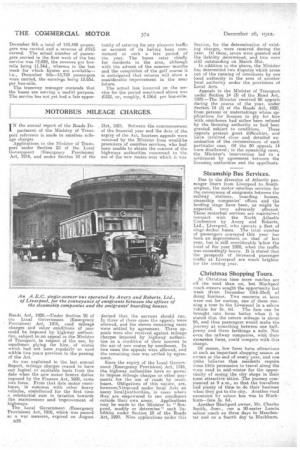MOTORBUS MILEAGE CHARGES.
Page 20

If you've noticed an error in this article please click here to report it so we can fix it.
N the annual report of the Roads Department of the Ministry of Transport reference is made to omnibus mileage charges. Applications to the Minister of Transport under Section 20 of the Local Government (Emergency Provisions) Act, 1916, and under Section 10 of the Roads Act, l920.—Under Section 20 of the Local Government (Emergency Provisions) Act, 1916, road mileage charges and other conditions of user could be imposed by highway authorities, subject to an appeal to the-Minister of Transport, in respect of the use, by omnibuses plying for hire, of routes which had not been regularly se used within two years previous to the passing of the Act.
As was explained in the last annual Report, mileage charges ceased to have any logical or equitable basis froth the date when the new motor licence duties imposed by the Finance Act, 1920, came into force. From that date motor omnibuses, in common with other heavy vehicles contributed for the first time substantial sum in taxation towards the maintenance and improvement of highways.
The Local Government (Emergency Provisions) Act, 1916, which was passed as a war measure, expired on August 328 31st, 1921. Between the commencement of the financial year and the date of the expiry of the Act, fourteen appeals were received by the Minister from would-be promoters of omnibus services, who had been unable to obtain the consent of the highways authorities concerned to the use of the new routes over which it was desired that the services should run. In three of these cases the appeals were allowed, and the eleven remaining cases were settled by agreement. Three appeals were also received against mileage charges imposed by highway authorities as a conditien of their consent to the use of new routes by omnibuses. In two cases the appeals were allowed, and the remaining case was settled by agreement.
Since the expiry of the Local Government (Emergency Provisions) Act, 1{116, the highway authorities have no power to impose mileage charges or other pay,ments for the use of roads by omnibuses. Obligations of this nature, are, however:Vimposed under local Acts on many local;tauthoritiesi cases where they are empowered to run omnibuses outside their own areas. Applications may be made to the Minister to " Suspend, modify or determine" such liabilities under Section 10 of the Roads Act, 1920. Nine applications under this Section, for the determination of existing charges, were received during the year. Of these, seven were granted and the liability determined, and two were still outstanding on March 31st.
In addition to the above, the Minister has determined two disputes which arose out of the running of omnibuses by one local authority in the area of another local authority under the provisions of Local Acts.
Appeals to the Minister of Transport under Section 14 (3) of the Road Act, 1920.—The Minister received 80 appeals during the course of the year, under Section 14 (3) of the Roads Act, 1920, from persons or undertakings whose applications for licences to ply for hire with omnibuses had either been refused by the licensing authority or had been granted subject to conditions. These appeals present great difficulties, and have involved 'close and detailed examination of the circumstances of each particular case. Of the 80 appeals 14 were disallowed ; in the remaining cases, the Minister's intervention led to a settlement by agreement between the licensing authorities and the appellants.
Due to the diversion of Atlantic passenger liners from Liverpool to Southampton, the motor omnibus services for the conveyance of emigrants between the railway stations, boarding houses, steamship companies' offices and the landing stage have been, as might be expected, very adversely affected. These motorbus services are mcintained contract with the North Atlantic Conference by Avery and Roberts, Ltd., Liverpool, who operate a fleet of singe-decker buses. The total number of passengers conveyed this year has been an improvement on that of last year, but is still considerably Mow the total of tie year 1920, when the traffic was exceedingly heavy. It is stated that the prospects of increased passenger traffic. at Liverpool are much brightei for the coming year.
Christmas Shopping Tours.
At, Christmas time more coaches are off the road than on, but Blackpool coach owners sought the opportunity last week from •December 18th-23rd) of doing bu.siness. Two concerns at least were out for custom, one of them running a tour to the Liverpool in a saloon vehicle for 5s. 6d. The fare can be brought into focus better when it is stated that the return mileage is about 96, and thus passengers would make the journey at something between one halfpenny and three farthings a mile. Not even the railway companies, with their excursion fares, could compete with this charge. •
Of course, low fares have attractions at such an important shopping season as occurs at, the end of every year, and one quite believes that residents require some little persuasion to travel along the osxen road in mid-winter for the opportunity of seeing: the city shops in their most attractivis•attire. The journey, commenced at 9 a.m., so that the travellers had plenty of time to do their business' when they got to the city. Another road excursion by saloon bus was to Blackburn—fare 3s. 6d.
Another Blackpool owner, Mr. Charles Smith, Junr., ran a 20-seater Lancia Saloon coach on three days to Manchester and on a fourth day to Blackburn.






























